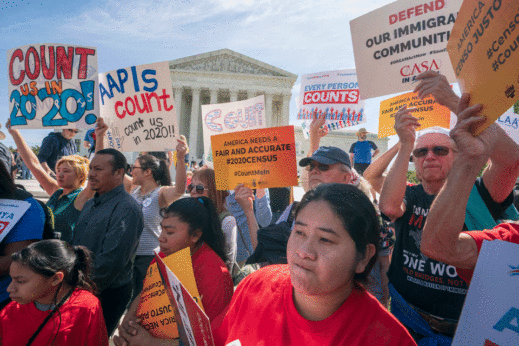
On Tuesday, April 23, the U.S. Supreme Court heard arguments on the Trump administration’s appeal of prior rulings that had forbidden the government from adding a new question about citizenship to the 2020 national census. The Trump White House claims that asking whether each person in a household is a citizen or not will somehow help the Justice Department enforce the 1965 Voting Rights Act. But immigrants’ and civil rights organizations, plus the Democratic Party leadership at all levels, smell a rat. They have gone to court to block the addition of the question.
The case now under review is a rush appeal by the Trump administration of decisions by three lower courts which had disallowed the citizenship question, partly on the grounds that it would be likely to suppress the census count in certain demographics. This would thwart the clear intention in the U.S. Constitution to have the census accurately count every human being living in the country, no matter what their citizenship situation.
The census is administered by the U.S. Department of Commerce. Commerce Secretary Wilbur Ross had claimed, apparently falsely, that the Justice Department had asked Commerce to add the question so that it could do a better job of ensuring compliance with the Voting Rights Act. However, documents that surfaced in the course of the district court trials revealed that, in fact, the idea of adding the citizenship question was cooked up among Ross, Steve Bannon, and Chris Kobach. The latter two are far-right figures well known for their xenophobic anti-immigrant stances and their involvement in voter suppression efforts.
The main Justice Department official involved in this situation is John Gore, Principal Deputy Assistant Attorney General for the Department of Justice’s Civil Rights Division. Gore, another Trump appointee, also has a history of involvement in voter suppression efforts.
The idea that Ross, Bannon, Kobach, and Trump have suddenly become born-again defenders of minorities’ rights to vote is a bit much. Minority and immigrant, especially Latin American, communities are currently being terrorized by the same administration that wants to add the citizenship question. The problem is extreme at the very top: The president himself has repeatedly claimed, without a shred of evidence, that in the 2016 elections, Hillary Clinton only bested him in the popular vote because millions of “illegal aliens” voted for her. Trump appointed a now defunct commission, headed by Kobach, to try to prove that non-citizens were voting in massive numbers.
The hate rhetoric against non-citizens (and even naturalized citizens) from Trump and his people only gets worse. In addition to the horrors on the U.S.-Mexico border, the number of families in the interior of the country which have been broken up by immigration raids grows with every passing month. Then there are the threats by the Trump administration against “sanctuary cities,” the latest being that the government will bus huge numbers of migrants and asylum seekers to them, which Trump thinks is somehow a way to punish such cities.
So non-citizens and citizens in households with non-citizen members have every reason to fear anything the Trump administration comes up with, especially if it has anything to do with citizenship status. And for the administration to say that all this is to help uphold the Voting Rights Act, which it is, in fact, doing its best to destroy, can elicit only a bitter laugh.
As a result, the danger is that people in such communities might not fill out and return the census questionnaire at all, or might omit the information on non-citizen members of their households. This would suppress the count, some think by as much as 6.5 percent, and thus thwart the intention of the Constitution’s framers that the census accurately count everybody living in the country. This would be an unconstitutional result, which is what plaintiffs in the case have argued.

But to suppress the count is probably what the Trump administration actually wants, as it would fit in nicely with the overall Republican voter suppression strategy. The census is used for legislative redistricting. So the number of congressional seats each state will get, and also the number of electoral votes in the presidential election, is based on it. State legislative redistricting is also based on census data. And very importantly, the allocation of federal funds to the states for a wide variety of public programs is also based on census information. So to suppress the minority vote, which the Republicans have been doing by a number of other means, would help the right-wing Republican partisan agenda.
Actually, there used to be a citizenship question in the census, but it was dropped in 1960 and not revived until now, because the Census Bureau at that time determined that there were other, better ways of finding out the aggregate citizenship data they were interested in, including other surveys that the Census Bureau, other government agencies, and academic institutions conduct.
Initial reports from the Tuesday Supreme Court session suggest that the five right-wing justices, including the two Trump appointees (Neil Gorsuch and Brett Kavanaugh), will likely rule in favor of the Trump administration’s appeal, allowing the question to be added.
In addition to the court action, Democrats in the House of Representatives are trying to investigate how the issue originally arose. Rep. Elijah Cummings, D-Md., the chair of the House Committee on Oversight and Reform, has subpoenaed the Justice Department’s Gore to testify about how the citizenship question was initiated. The Justice Department has refused to allow Gore to testify unless he has a Justice Department lawyer with him, which Cummings, in turn, has refused to concede.
If the citizenship question is included in the 2020 census, it will be one more reason to defeat Trump and the Republicans in that year’s elections.










